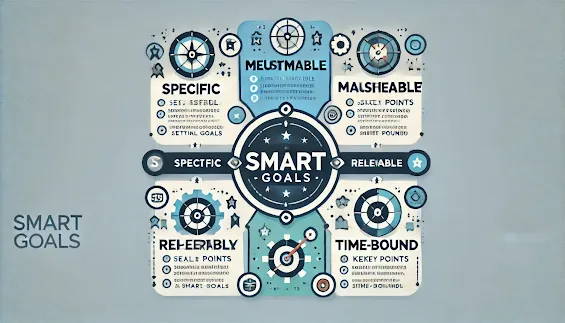Setting personal goals is a powerful tool for personal growth and success. Goals provide a clear direction and motivation, acting as a roadmap to your desired future. They help us focus our efforts and measure our progress, ultimately leading to a more fulfilling and purposeful life. But why do so many people struggle to achieve their goals? Is there a secret formula to success, or is it all about mindset and strategy? In this blog post, we’ll explore the process of setting and achieving personal goals, providing you with actionable tips and insights to help you turn your dreams into reality.
Definition of Personal Goals
Personal goals are specific objectives that individuals set for themselves, aiming to achieve particular outcomes in various aspects of life. These goals serve as benchmarks for personal growth, helping individuals focus on what truly matters to them.
Types of Personal Goals
Personal goals can be categorized into short-term and long-term goals. Short-term goals are objectives that can be achieved in a relatively short period, such as within a few days, weeks, or months. Long-term goals, on the other hand, are broader and more complex, often requiring years to accomplish.
Examples of personal goals include:
- Career Goals: Advancing in your profession, starting a business, or acquiring new skills.
- Health Goals: Improving physical fitness, losing weight, or adopting healthier eating habits.
- Relationship Goals: Strengthening personal relationships, finding a life partner, or improving communication skills.
- Personal Development Goals: Enhancing self-awareness, learning new hobbies, or pursuing educational opportunities.
The Psychology of Goal Setting
Why We Set Goals
Setting goals is deeply rooted in human psychology. Goals provide us with a sense of purpose and direction, giving us something to strive for. They tap into our intrinsic motivation, which drives us to take action and make progress. When we set goals, we create a vision of our future selves, which can be incredibly motivating.
The Science Behind Goal Achievement
Numerous studies have shown that goal setting is linked to higher levels of success. One widely recognized framework is the SMART criteria, which stands for Specific, Measurable, Achievable, Relevant, and Time-bound. Goals that meet these criteria are more likely to be achieved because they are clearly defined and actionable.
Research also highlights the importance of writing down goals. A study conducted by Dr. Gail Matthews, a psychology professor at Dominican University, found that people who wrote down their goals were 42% more likely to achieve them than those who didn’t. This is because writing down goals makes them tangible and reinforces commitment.
Setting Effective Goals
The SMART Criteria
The SMART criteria provide a structured approach to goal setting. Let’s break down each component:
- Specific: Clearly define what you want to achieve. Avoid vague goals; instead, focus on specific outcomes.
- Measurable: Establish criteria for tracking progress. How will you know when you’ve achieved your goal?
- Achievable: Ensure that your goal is realistic and attainable. While it’s important to challenge yourself, setting an impossible goal can lead to frustration.
- Relevant: Your goal should align with your broader life objectives and values.
- Time-bound: Set a deadline for your goal. Having a timeframe creates a sense of urgency and helps maintain focus.
Visualizing Your Goals
Visualization is a powerful tool for goal achievement. Techniques such as creating vision boards or journaling can help you mentally rehearse your success. When you visualize your goals, you create a mental image of the desired outcome, which can boost confidence and motivation.
Breaking Down Goals
Large goals can be overwhelming, making it difficult to know where to start. Breaking down your goals into smaller, manageable steps can make the process more approachable. By focusing on one step at a time, you can maintain momentum and gradually work towards your larger objective.
Creating an Action Plan
Developing a Step-by-Step Plan
An action plan is a detailed outline of the steps you need to take to achieve your goals. Start by identifying the first action you need to take, then build from there. Each step should be specific and time-bound to keep you on track.
Setting Milestones
Milestones are smaller achievements that mark your progress towards the ultimate goal. They serve as checkpoints that allow you to assess your progress and make adjustments if needed. Celebrating these milestones can provide motivation and a sense of accomplishment.
Overcoming Challenges
Common Obstacles to Goal Achievement
Even with the best plans, obstacles can arise. Common challenges include procrastination, lack of resources, and self-doubt. Recognizing these potential setbacks is the first step in overcoming them.
Strategies for Overcoming Challenges
To overcome obstacles, it’s important to stay flexible and adapt your plan as needed. Techniques such as time management, seeking support from others, and maintaining a positive mindset can help you stay on track. If you encounter a setback, don’t be discouraged—use it as an opportunity to learn and grow.
Staying Accountable
The Role of Accountability
Accountability is crucial for staying committed to your goals. Sharing your goals with an accountability partner or joining a group can provide external motivation and support. Knowing that someone else is aware of your goals can help you stay focused and committed.
Tracking Progress
Regularly tracking your progress allows you to see how far you’ve come and identify areas where you may need to make adjustments. Tools such as apps, journals, or spreadsheets can help you monitor your progress and stay organized.
Celebrating Achievements
Recognizing Milestones
Celebrating small wins is important for maintaining motivation. Each milestone you achieve brings you one step closer to your ultimate goal, and recognizing these achievements reinforces your commitment.
Reflecting on the Journey
Taking time to reflect on your journey allows you to evaluate what worked well and what didn’t. This reflection can provide valuable insights for future goal setting and help you continue growing and improving.
Conclusion
Setting and achieving personal goals is a transformative process that can lead to significant personal growth and fulfillment. By understanding the psychology behind goal setting, using the SMART criteria, and developing a detailed action plan, you can increase your chances of success. Remember to stay accountable, overcome challenges, and celebrate your achievements along the way. So why wait? Start setting your personal goals today, and take the first step towards a brighter future.
Additional Resources
Recommended Books and Articles
- "Atomic Habits" by James Clear - A guide to building good habits and breaking bad ones.
- "The Power of Habit" by Charles Duhigg - An exploration of the science behind habit formation.
- "SMART Goals: How to Make Your Goals Achievable" - An article that delves deeper into the SMART criteria.
Links to Goal Setting Tools
- Trello - A project management tool that can help you organize and track your goals.
- Habitica - A habit-building and productivity app that gamifies your goals.
- Goal Buddy - A goal-setting app that includes features for accountability and progress tracking.
FAQs
Q. What are the most effective strategies for setting and achieving personal goals?
Ans. The most effective strategies include using the SMART criteria, breaking down goals into manageable steps, and regularly tracking progress.
Q. How can I maintain discipline and self-control over time?
Ans.
Maintaining discipline requires consistent effort, setting clear priorities, and staying motivated by focusing on the benefits of achieving your goals.
Q. What role does financial literacy play in achieving personal goals?
Ans. Financial literacy is crucial for achieving personal goals, especially those related to financial stability, savings, and investments. Understanding money management helps you make informed decisions and avoid financial pitfalls.
Q. How can I balance work and personal life while pursuing my goals?
Ans. Balancing work and personal life requires effective time management, setting boundaries, and prioritizing tasks that align with your personal goals.
Q. What are some common pitfalls when setting personal goals?
Ans. Common pitfalls include setting unrealistic goals, lacking a clear plan, and failing to track progress. It’s important to avoid these mistakes by being specific, realistic, and organized in your goal-setting process.


